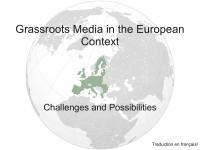On Friday the 1st of October, Radio Dreyeckland held the workshop “Grassroots Media in the European Context - Challenges and Possibilities” at the NoBorder Camp in Brussels. Almost 20 persons living in four different countries participated. With this article we want to document the outcome of the workshop.
The general goal of the Workshop was better networking between grassroots media within europe. Due to organising problems the workshop started approximatelly 45 minutes late. Nevertheless, around 20 people turned up. The workshop was held in English and slides were used to visualize the content. We offered a translation to French but none of the people attending requested a translation.
First we tried to explain the reasons why we think european grassroots media has to connect even further. The european institutions are a highly complex structure and international lobbies spend millions of EUROs each year to protect their interests. The EU gets more powerful every year and has influence on most of our social struggles. European networking at grassroots level does not happen too much across language barriers and across social movements. For example within the antifascist movement or within the anti-nuclear movement an international interchange is already happening somewhat but it is limited to certain topics.
The workshop in general was split into two sections. In the first section we tried to design a plattform for content-exchange between european grassroots media. What do we need in order to share content across language and politcal borders and across borders of political movements limited to one issue?
One of the first points mentioned in this debate was the lack of ressources to translate content into other languages. A proposal made from one participant was to write a short but informative abstract of an article and translate just this abstract into other languages instead of the entire article. This way people in other countries can figure out whats going on and can, if interested, organize further translations. Another point made on this issue was that radios sometimes don't even need translated audio material - sometimes it helps to have some background noises from a demo for example to make a nice audio feature yourself.
Another point brought up in the discussion are the technical difficulties a lot of people face when translating content. One participant suggested that crowdsourcing might be the best way to encourage people to make translations. Several examples for sucessful translations via crowdsourcing have been made. This does obviously just works if the content of the article is considered worthwile to translate and technical obstacles are low.
Since a lot of Indymedia activists have been reporting from the NoBorder Camp [ 1 | 2 | 3 | 4 | 5 | 6 | 7 | 8 | 9 | 10 | 11 | 12 ] the discussion turned as well to the role of Indymedia. The role of Indymedia Belgium was mentioned and some activists tried to summarise the situation. In general Indymedia was mentioned as an example of international networking already happening. Some people explained that they see the strength of Indymedia rather in documenting the local struggles but the international exchange of content is hardly happening. As an example of the failure of the international networking Indymedia global was mentioned. This site tries to gather important Indymedia content worldwide but fails in achieving this task. One participant mentioned as well the process of Indymedia Italy where a nation wide network got decentralized and local IMCs started to work. Nowadays, a nation wide coordination of content is happening again. Another example mentioned was the Synde project which intents to gather all content from German speaking Indymedias.
One participant voiced support for a more open way of publishing than Indymedia. Indymedia collectives have to meet certain standards to join the network. As an example the Blogsport Network was mentioned. There groups can write their own blogs and all content gathers at Blogsport Planet. As a response particpants said that there are too many posts to keep up to date. In conclusion one has to decide between free posting without moderation which produces a lot of "noise" and possible censorship due to moderation of content.
Another issue mentioned in the discussion is the uncertainty regarding copyrgiht issues. Some Indymedias document mainstream media articles in order to preserve them as an archive to the public. Other participants search for copyleft licensed material to use in their articles, videos or audio features. Participants answered that google is now offering for example in their image search the limitation to creative commons licensed material.
In the second part of the workshop we tried to gather a list of networks the participants use for content exchange. The list is docuemented here:
- Freie Radios.net [german content]
- Different Indymedias
- Alternative Dresden News [german content]
- Anarchia Dresden [german content]
- De Wereld Morgen.be [dutch content]
- Planet Blogsport [german content]
- Community Media Forum Europe (CMFE)
- Global Voices [multilingual]
If you want to share the Networks you use for content exchange please leave a comment.
If you want to, you can translate the article.

